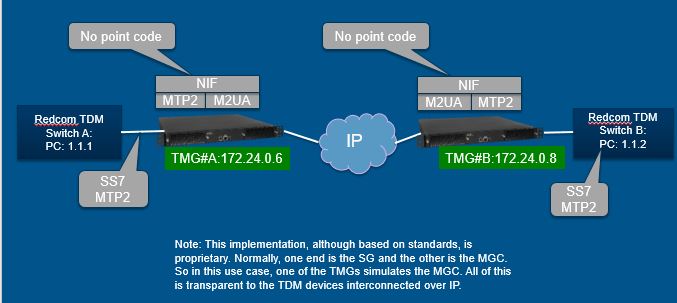Use Cases:TMG Performing M2UA Signaling Relay
From TBwiki
(Difference between revisions)
Nicole Tan (Talk | contribs) |
Nicole Tan (Talk | contribs) |
||
| Line 17: | Line 17: | ||
{| colspan="4" border="1" class="wikitable" | {| colspan="4" border="1" class="wikitable" | ||
! width="300" style="background: none repeat scroll 0% 0% rgb(0, 83, 139);" | Configure TMG: M2UA Replay | ! width="300" style="background: none repeat scroll 0% 0% rgb(0, 83, 139);" | Configure TMG: M2UA Replay | ||
| − | ! width=" | + | ! width="300" style="background: none repeat scroll 0% 0% rgb(0, 83, 139);" | Configure TMG: M2UA SG |
|- | |- | ||
| | | | ||
Revision as of 09:13, 29 July 2016
Editing Use Cases:TMG Performing M2UA Signaling Relay WikitextPreviewChanges BoldItalicEmbedded fileSignature and timestampLinkReferenceAdvancedSpecial charactersHelp
Applies to version(s): v2.9 and above
In this scenario, all messages from TDM network are relayed to the IP network via Sigtran: M2UA

Note: This implementation, although based on standards, is proprietary.
Normally, one end is the SG and the other is the MGC. So in this use case, one of the TMGs simulates the MGC. All of this is transparent to the TDM devices interconnected over IP.
| Configure TMG: M2UA Replay | Configure TMG: M2UA SG |
|---|---|
|
|